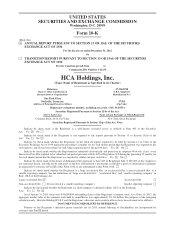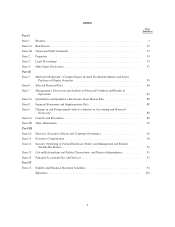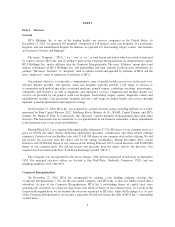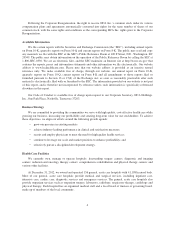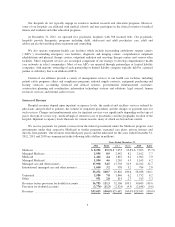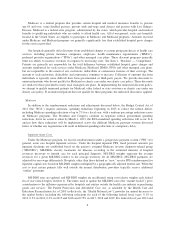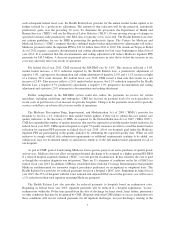HCA Holdings 2012 Annual Report Download - page 15
Download and view the complete annual report
Please find page 15 of the 2012 HCA Holdings annual report below. You can navigate through the pages in the report by either clicking on the pages listed below, or by using the keyword search tool below to find specific information within the annual report.
under the PFS. Since 2003, the U.S. Congress has passed multiple legislative acts delaying application of the
SGR to the PFS. The most recent legislative delay extends calendar year 2012 payment rates through
December 31, 2013. We cannot predict whether the U.S. Congress will intervene to prevent this reduction to
payments in the future. Barring delay or repeal of the SGR by Congress, Medicare payments to physicians are
scheduled to be cut significantly effective January 1, 2014.
Other
Under PPS, the payment rates are adjusted for the area differences in wage levels by a factor (“wage index”)
reflecting the relative wage level in the geographic area compared to the national average wage level. Beginning
in federal fiscal year 2007, CMS adjusted 100% of the wage index factor for occupational mix. The redistributive
impact of wage index changes, while slightly negative in the aggregate, is not anticipated to have a material
financial impact for 2013. However, the Health Reform Law requires HHS to provide Congress with
recommendations on how to comprehensively reform the Medicare wage index system.
Medicare reimburses hospitals for a portion of bad debts resulting from deductible and coinsurance amounts
that are uncollectible from Medicare beneficiaries. The Middle Class Tax Relief and Jobs Creation Act of 2012
(the “Jobs Creation Act”) reduces the percentage of bad debt amounts that Medicare reimburses from 70% to
65% beginning in federal fiscal year 2013. These reductions are intended to offset, in part, the impact of the
legislative delay of the SGR reductions in physician compensation under the PFS. The U.S. Congress has not
permanently addressed the SGR reductions, and any further delays or revisions to the SGR may be offset by
additional reductions in Medicare payments to other types of providers.
As required by the MMA, CMS has implemented contractor reform whereby CMS competitively bids the
Medicare fiscal intermediary and Medicare carrier functions to 15 Medicare Administrative Contractors
(“MACs”), which are geographically assigned and service both Part A and Part B providers within a given
jurisdiction. CMS awarded initial contracts to all 15 MAC jurisdictions. While chain providers had the option of
having all hospitals use one home office MAC, HCA chose to use the MACs assigned to the geographic areas in
which our hospitals are located. CMS periodically resolicits bids, and the MAC servicing a geographic area can
change as a result of the bid competition. MAC transition periods can impact claims processing functions and the
resulting cash flow.
Under the Recovery Audit Contractor (“RAC”) program, CMS contracts with RACs on a contingency basis
to conduct post-payment reviews to detect and correct improper payments in the fee-for-service Medicare
program. CMS has implemented the RAC program on a permanent, nationwide basis as required by statute. The
compensation for the RACs is based on their review of claims submitted to Medicare for billing compliance,
including correct coding and medical necessity, and the amount of overpayments and underpayments they
identify. Historically, RACs have conducted their reviews on a post-payment basis. In February 2012, CMS
announced that it was initiating a RAC prepayment demonstration program in 11 states.
We have established policies and procedures to respond to the RAC requests and payment denials. Payment
recoveries resulting from RAC reviews and denials are appealable through administrative and judicial processes.
We have actively pursued reversal of adverse determinations at appropriate appeal levels, and we intend to
continue this process. We are incurring additional costs to respond to requests for records and pursue the reversal
of payment denials, in addition to the overpayments that are not reversed upon appeal. Amounts that have not
been reversed upon appeal have not been significant, but the number and amount of claims subject to RAC
review has been steadily increasing, and we expect this trend to continue during 2013. Depending upon the
growth of RAC programs and our success in appealing claims in future periods, our cash flows and results of
operations could be negatively impacted.
11


